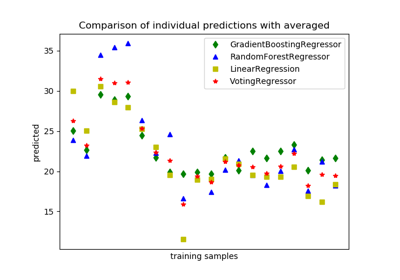sklearn.ensemble.VotingRegressor¶
-
class
sklearn.ensemble.VotingRegressor(estimators, weights=None, n_jobs=None)[source]¶ Prediction voting regressor for unfitted estimators.
New in version 0.21.
A voting regressor is an ensemble meta-estimator that fits base regressors each on the whole dataset. It, then, averages the individual predictions to form a final prediction.
Read more in the User Guide.
Parameters: - estimators : list of (string, estimator) tuples
Invoking the
fitmethod on theVotingRegressorwill fit clones of those original estimators that will be stored in the class attributeself.estimators_. An estimator can be set toNoneor'drop'usingset_params.- weights : array-like, shape (n_regressors,), optional (default=`None`)
Sequence of weights (
floatorint) to weight the occurrences of predicted values before averaging. Uses uniform weights ifNone.- n_jobs : int or None, optional (default=None)
The number of jobs to run in parallel for
fit.Nonemeans 1 unless in ajoblib.parallel_backendcontext.-1means using all processors. See Glossary for more details.
Attributes: - estimators_ : list of regressors
The collection of fitted sub-estimators as defined in
estimatorsthat are notNone.- named_estimators_ : Bunch object, a dictionary with attribute access
Attribute to access any fitted sub-estimators by name.
See also
VotingClassifier- Soft Voting/Majority Rule classifier.
Examples
>>> import numpy as np >>> from sklearn.linear_model import LinearRegression >>> from sklearn.ensemble import RandomForestRegressor >>> from sklearn.ensemble import VotingRegressor >>> r1 = LinearRegression() >>> r2 = RandomForestRegressor(n_estimators=10, random_state=1) >>> X = np.array([[1, 1], [2, 4], [3, 9], [4, 16], [5, 25], [6, 36]]) >>> y = np.array([2, 6, 12, 20, 30, 42]) >>> er = VotingRegressor([('lr', r1), ('rf', r2)]) >>> print(er.fit(X, y).predict(X)) [ 3.3 5.7 11.8 19.7 28. 40.3]
Methods
fit(self, X, y[, sample_weight])Fit the estimators. fit_transform(self, X[, y])Fit to data, then transform it. get_params(self[, deep])Get the parameters of the ensemble estimator predict(self, X)Predict regression target for X. score(self, X, y[, sample_weight])Returns the coefficient of determination R^2 of the prediction. set_params(self, \*\*params)Setting the parameters for the ensemble estimator transform(self, X)Return predictions for X for each estimator. -
fit(self, X, y, sample_weight=None)[source]¶ Fit the estimators.
Parameters: - X : {array-like, sparse matrix}, shape (n_samples, n_features)
Training vectors, where n_samples is the number of samples and n_features is the number of features.
- y : array-like, shape (n_samples,)
Target values.
- sample_weight : array-like, shape (n_samples,) or None
Sample weights. If None, then samples are equally weighted. Note that this is supported only if all underlying estimators support sample weights.
Returns: - self : object
-
fit_transform(self, X, y=None, **fit_params)[source]¶ Fit to data, then transform it.
Fits transformer to X and y with optional parameters fit_params and returns a transformed version of X.
Parameters: - X : numpy array of shape [n_samples, n_features]
Training set.
- y : numpy array of shape [n_samples]
Target values.
Returns: - X_new : numpy array of shape [n_samples, n_features_new]
Transformed array.
-
get_params(self, deep=True)[source]¶ Get the parameters of the ensemble estimator
Parameters: - deep : bool
Setting it to True gets the various estimators and the parameters of the estimators as well
-
predict(self, X)[source]¶ Predict regression target for X.
The predicted regression target of an input sample is computed as the mean predicted regression targets of the estimators in the ensemble.
Parameters: - X : {array-like, sparse matrix} of shape (n_samples, n_features)
The input samples.
Returns: - y : array of shape (n_samples,)
The predicted values.
-
score(self, X, y, sample_weight=None)[source]¶ Returns the coefficient of determination R^2 of the prediction.
The coefficient R^2 is defined as (1 - u/v), where u is the residual sum of squares ((y_true - y_pred) ** 2).sum() and v is the total sum of squares ((y_true - y_true.mean()) ** 2).sum(). The best possible score is 1.0 and it can be negative (because the model can be arbitrarily worse). A constant model that always predicts the expected value of y, disregarding the input features, would get a R^2 score of 0.0.
Parameters: - X : array-like, shape = (n_samples, n_features)
Test samples. For some estimators this may be a precomputed kernel matrix instead, shape = (n_samples, n_samples_fitted], where n_samples_fitted is the number of samples used in the fitting for the estimator.
- y : array-like, shape = (n_samples) or (n_samples, n_outputs)
True values for X.
- sample_weight : array-like, shape = [n_samples], optional
Sample weights.
Returns: - score : float
R^2 of self.predict(X) wrt. y.
Notes
The R2 score used when calling
scoreon a regressor will usemultioutput='uniform_average'from version 0.23 to keep consistent withmetrics.r2_score. This will influence thescoremethod of all the multioutput regressors (except formultioutput.MultiOutputRegressor). To specify the default value manually and avoid the warning, please either callmetrics.r2_scoredirectly or make a custom scorer withmetrics.make_scorer(the built-in scorer'r2'usesmultioutput='uniform_average').
-
set_params(self, **params)[source]¶ Setting the parameters for the ensemble estimator
Valid parameter keys can be listed with get_params().
Parameters: - **params : keyword arguments
Specific parameters using e.g. set_params(parameter_name=new_value) In addition, to setting the parameters of the ensemble estimator, the individual estimators of the ensemble estimator can also be set or replaced by setting them to None.
Examples
# In this example, the RandomForestClassifier is removed clf1 = LogisticRegression() clf2 = RandomForestClassifier() eclf = VotingClassifier(estimators=[(‘lr’, clf1), (‘rf’, clf2)] eclf.set_params(rf=None)


